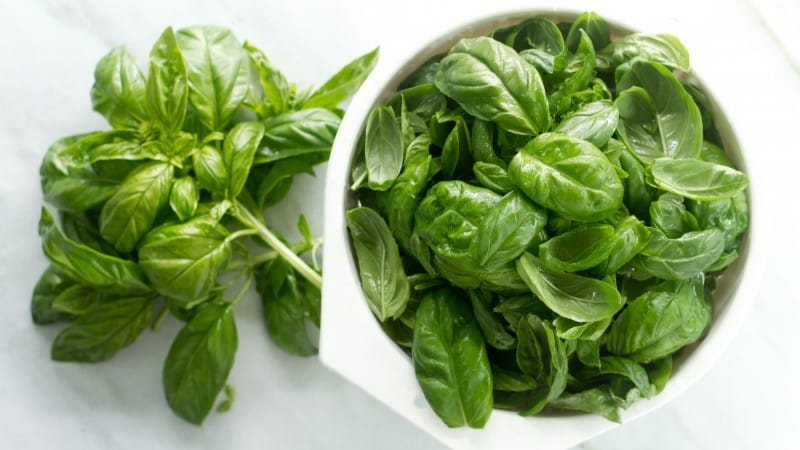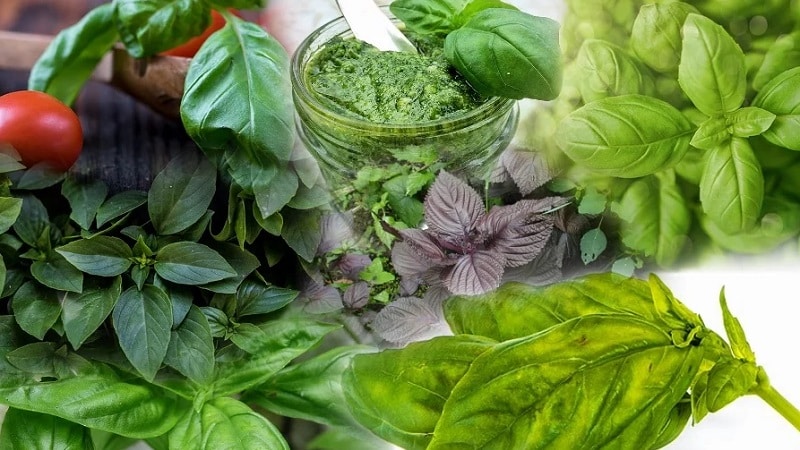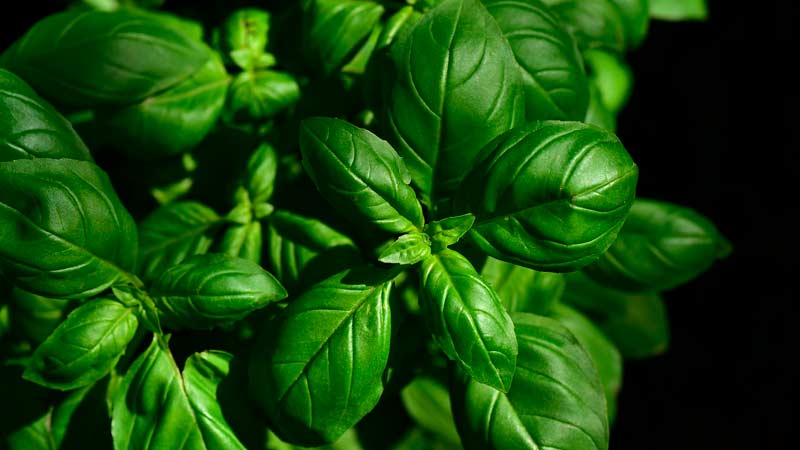Useful properties and contraindications of basil for women
A spicy herb from the tropical regions of Asia is not only used as a flavoring and aromatic component of culinary dishes, but is also widely used in medicine. Various types of this plant are effective for the prevention and treatment of inflammatory processes, gastrointestinal diseases, and increasing general tone. Let's talk about the medicinal properties and contraindications of basil for women.
Chemical composition of basil

Different plant species have purple or green leaves. The latter have a more delicate taste and aroma, while the former are more rich and tart.
Reference. Purple leaves contain colored pigments called anthocyanins, which reduce inflammatory reactions and prevent cell damage due to oxidation.
On average, 100 g of an annual plant of the Lamiaceae family contains:
- protein - 2.5 g;
- fats - 0.6 g;
- nicotinic acid - 0.9 mg;
- ascorbic acid - 18 mg;
- beta-carotene - 3.14 mg;
- vitamin B1 - 0.034 mg;
- vitamin B6 - 0.155 mg;
- iron - 18 mg;
- potassium - 290 mg;
- copper - 385 mg;
- calcium - 177 mg;
- manganese - 1.15 mg.
Energy value - 27 kcal. Basil contains phytoncides, tannins and essential oil.
The benefits of basil for a woman’s body
The leaves and seeds of the plant, available for absorption, contain a large amount of useful substances that contribute to the health of the body. Both purple and green varieties of the spicy plant are used for medicinal purposes.

For weight loss
For some time now the seeds Basil began to be used to lose extra pounds. Although a direct relationship between consumption of this product and weight loss has not been proven, basil is recommended to be included in the diet to support the body under stress.
Useful properties of basil for women when losing weight:
- the diuretic effect prevents the accumulation of excess fluid and eliminates swelling;
- stimulation of digestion helps to quickly process food entering the body;
- acceleration of metabolism leads to rapid elimination of toxins.
In the first days, the effect of using the product will not be noticeable. The result will come only after getting used to it.
Prevention of inflammatory processes
Basil is a powerful antioxidant. Its seeds and leaves relieve inflammation of various organs, including facial skin. Masks based on this plant relieve redness, irritation and other inflammatory processes of the epidermis.
The spice is effective for the prevention and treatment of:
- colds and inflammatory diseases;
- bleeding gums;
- periodontal disease and bad breath;
- abdominal pain;
- flatulence;
- swelling;
- bladder diseases.
For women over 45 years old
Basil mint oil, or camphor oil, slows down the aging process of the skin and smoothes out wrinkles. Holy basil, or tulsi, increases stress resistance and reduces blood glucose and cholesterol levels.
In general, all types of plants help:
- activate the body's defenses;
- tone and refresh facial skin;
- remove plaque from the surface of teeth;
- get rid of bad breath;
- normalize the functioning of the cardiovascular system;
- stabilize blood pressure in hypotensive patients;
- eliminate headaches;
- increase libido;
- reduce age-related skin pigmentation.
Is it possible while breastfeeding?
Spicy basil leaves are useful during lactation:
- increase the volume of breast milk;
- improve its taste and increase the baby's appetite.
However, before consuming the plant, it is important to consult a pediatrician so as not to harm the child.
Contraindications and possible harm

No matter how useful the plant is, its uncontrolled use will harm the body. Basil is not recommended for:
- gastritis;
- epilepsy;
- peptic ulcer of the stomach and duodenum;
- diabetes mellitus 1 and 2 types;
- coronary heart disease;
- hypertension;
- poor blood clotting;
- thrombosis and thrombophlebitis;
- varicose veins;
- recent stroke and myocardial infarction.
Due to the high content of essential oils, the plant is contraindicated pregnant women, because it increases the tone of the uterus, which threatens pregnancy failure, especially in the early stages.
An overdose of the plant's essential oil can cause severe irritation of the mucous membranes of organs, which leads to clinical convulsions.
Conclusion
Basil is effective for the prevention and auxiliary treatment of many diseases, suitable for nursing mothers (after consultation with a pediatrician), and is used in cosmetology. However, for a woman’s health, basil can bring not only benefits, but also harm. You should not indulge in uncontrolled consumption of the plant: such irresponsibility can lead to the development of allergic reactions and exacerbation of existing chronic diseases.